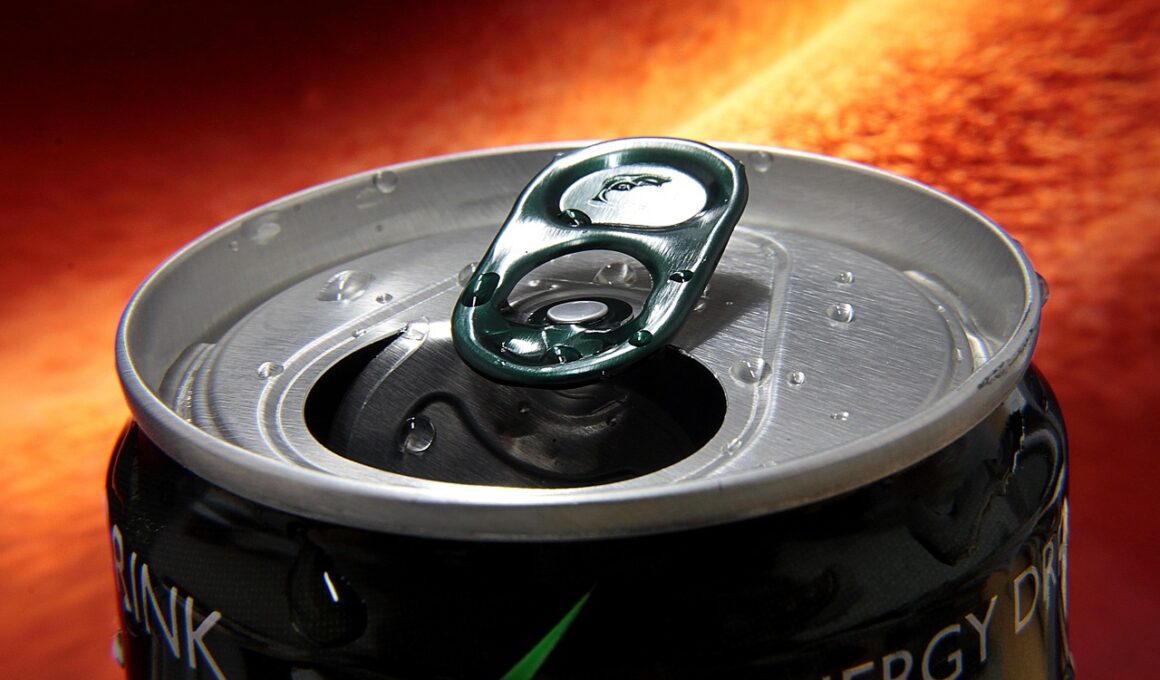Energy Drink Myths That May Harm Your Nutrition Goals
There are numerous misconceptions surrounding energy drinks that can mistakenly influence dietary choices among consumers. Many individuals believe that energy drinks can serve as meal replacements or provide a substantial nutritional benefit. However, these beverages often contain high amounts of sugar, caffeine, and artificial additives, which can detract from a balanced diet. Instead of enhancing one’s nutritional profile, frequent consumption of these drinks can lead to negative results, such as weight gain and increased risk of chronic diseases. Caffeine, while providing a temporary energy surge, may cause jitters, anxiety, and disrupted sleep patterns. Such components can sabotage efforts to maintain a healthy lifestyle. Furthermore, relying on energy drinks to boost performance during physical activities is misleading. Natural hydration and nutrition approaches remain essential for optimal performance. The caffeine inside energy drinks can also lead to dependency, pushing consumers to seek higher doses to achieve the same energy effect. This cycle not only harms nutritional goals but ultimately hinders overall physical health and wellness. Being aware of these myths is vital for making informed choices regarding energy drinks and ensuring adherence to nutrition goals.
Myth: Energy Drinks Provide Instant Nutrition
Many individuals assume that energy drinks offer tangible nutritional benefits, such as vitamins and minerals necessary for optimal health. Instead, most energy drinks primarily consist of sugar, caffeine, and taurine, among other additives, which don’t supply the micronutrients vital to well-being. The calorie count from these drinks often comes predominantly from sugars, contributing to calorie excess without nutritional value. Some consumers may be under the impression that energy drinks will enhance their nutrient intake, but they could substitute healthier food sources instead. This could lead to nutrient gaps and hinder the ability to achieve health goals. Additionally, the ingredients present in energy drinks may produce undesirable side effects, including digestive discomfort or heart palpitations. Such reactions can significantly detract from one’s fitness progress. Natural energy sources like fruits, vegetables, whole grains, and lean proteins are far superior for sustained energy without compromising health. Relying on energy drinks rather than wholesome foods can disrupt progress towards nutrition objectives. Thus, acknowledging these realities is essential for anyone striving to lead a healthy lifestyle and meet their desired nutrition targets.
Another prevalent myth is the belief that energy drinks enhance physical performance without risks. While some individuals report heightened energy post-consumption, studies have shown that these beverages may actually lead to dehydration. Caffeine acts as a diuretic, which can exacerbate dehydration, particularly during intense exercise sessions. Relying on these drinks for performance might inhibit the body’s natural hydration processes, negatively impacting endurance and recovery. Moreover, pairing energy drinks with workouts may create an unhealthy reliance on stimulants, leading to potential overuse. This mindset runs the risk of increased heart rates and cardiovascular stress, particularly for athletes looking to optimize their training. It’s crucial to remember that optimal performance relies on adequate hydration, nutritious foods, and proper recovery, rather than solely on energy drinks. Furthermore, athletes should focus more on balanced diets that provide the essential nutrients needed for sustained energy. Embracing natural fueling strategies can significantly enhance performance more effectively and safely than overconsumption of energy drinks. Breaking away from these misconceptions is vital for athletes aiming for longevity and peak performance in any sport.
Myth: Energy Drinks Are Safe in Any Amount
Another widespread myth is that energy drinks are safe to consume in unlimited quantities. Many young adults believe they can rely heavily on these drinks without facing long-term consequences. However, excessive consumption is linked to various health risks, including heart issues and anxiety disorders. The caffeine content in these beverages can vary significantly, leading individuals to underestimate their actual intake. Consuming more than the recommended daily limits can result in insomnia, irritability, and dependency on caffeine to function. Moreover, combining energy drinks with alcohol is dangerous as it can mask the depressant effects of alcohol, resulting in poor decision-making and risky behaviors. This dangerous combination can lead to severe health complications and even life-threatening situations. Nutrition experts advise moderation when it comes to energy drinks, emphasizing the importance of understanding individual tolerance levels. Moreover, overall consumption should not replace hydration from water or nutritious food sources. Maintaining a balanced diet and proper hydration should always take precedence over energy drinks. Staying responsible with energy drink consumption is critical for safeguarding one’s overall health and nutrition goals.
Another significant myth surrounding energy drinks is the perception that they do not promote weight gain or obesity. While marketed for energy and performance enhancement, these drinks often contain high sugar levels that contribute to increased calorie intake. The hidden calories from energy drinks can add up quickly, leading to unintended weight gain when they are consumed regularly. For those trying to maintain or lose weight, energy drinks can derail attempts to create a caloric deficit. Additionally, the feeling of energy they provide often leads to less awareness of hunger cues, increasing the likelihood of overeating. Sports drinks and energy drinks, while often confused, serve different purposes; the latter is more focused on stimulating energy rather than providing hydration or nutrients. Therefore, concerns over energy drinks can extend to every part of a person’s healthy lifestyle. Failing to recognize their contributions to excessive calorie consumption can impede overall fitness goals. Opting for healthier alternatives like herbal teas or smoothies not only nourishes the body but helps maintain better weight management. Hence, awareness of this myth can significantly assist individuals in achieving their health and fitness aspirations.
Myth: Energy Drinks Boost Mental Focus
Many consumers harbor the belief that energy drinks significantly enhance mental focus and cognitive abilities, leading to improved productivity. Although the caffeine and sugars present in these drinks do offer a temporary boost in alertness, the effects are often short-lived. Increased heart rates may actually hinder cognitive functions, leading to later fatigue and diminished performance. Overreliance on energy drinks can produce a cycle of dependency, where individuals struggle to concentrate without them. Moreover, the sudden energy spikes followed by crashes can create mood swings, affecting overall mental well-being. Engaging in regular physical activity and maintaining a balanced diet can yield more sustainable improvements in cognitive function. The body thrives on consistent nutrition and hydration for optimal energy levels. Additionally, incorporating mindfulness practices and proper sleep hygiene can significantly enhance mental clarity and focus without resorting to stimulants. Rethinking reliance on energy drinks for cognitive enhancement is essential for fostering healthier habits and encouraging lasting performance effects. Awareness of these misconceptions can help guide individuals in making informed choices for both nutrition and mental efficiency.
The myth that energy drinks are a quick fix for daily fatigue can also lead individuals to make poor dietary decisions. Many believe that consuming two or three energy drinks can sustain their energy levels throughout the day. However, this approach can mask underlying health issues, such as poor sleep or nutrient deficiencies, rather than addressing them directly. Ignoring the root cause of fatigue can lead to a cycle of dependence on energy drinks, causing ongoing health deterioration. Relying on these products can detract from important lifestyle changes, such as improving sleep habits and nutritional intake. A balanced diet enriched with whole foods and adequate hydration significantly enhances everyday energy levels without the drawbacks of energy drinks. Understanding that fatigue often arises from factors that caffeine cannot fix is crucial for a healthy lifestyle. Energy drinks should not replace necessary health habits or serve as substitutes for fundamental wellness principles. Embracing healthier long-term energy strategies is essential for overall well-being, productivity, and achieving one’s nutrition goals.


